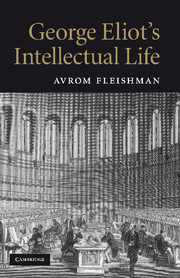Book contents
- Frontmatter
- Contents
- Acknowledgements
- Preface
- Introduction
- 1 The “Evangelical”: starting out in a Christian culture
- 2 The Apostate: moving beyond the Christian mythos
- 3 The Journalist: editing, reviewing, shaping a worldview
- 4 The Germanist: balancing the counterweight of German thinkers
- 5 The Novelist: mixing realism, naturalism and mythmaking
- 6 The Historian: tracking ideals – utopian and national – in Romola and The Spanish Gypsy
- 7 The “Radical”: taking an anti-political stance in Felix Holt
- 8 The Encyclopedist: transcending the past in Middlemarch
- 9 The Visionary: transmitting ideals in Daniel Deronda
- 10 The Intellectual: cultural critique in Impressions of Theophrastus Such
- Notes
- Works cited
- Name index
8 - The Encyclopedist: transcending the past in Middlemarch
Published online by Cambridge University Press: 05 April 2010
- Frontmatter
- Contents
- Acknowledgements
- Preface
- Introduction
- 1 The “Evangelical”: starting out in a Christian culture
- 2 The Apostate: moving beyond the Christian mythos
- 3 The Journalist: editing, reviewing, shaping a worldview
- 4 The Germanist: balancing the counterweight of German thinkers
- 5 The Novelist: mixing realism, naturalism and mythmaking
- 6 The Historian: tracking ideals – utopian and national – in Romola and The Spanish Gypsy
- 7 The “Radical”: taking an anti-political stance in Felix Holt
- 8 The Encyclopedist: transcending the past in Middlemarch
- 9 The Visionary: transmitting ideals in Daniel Deronda
- 10 The Intellectual: cultural critique in Impressions of Theophrastus Such
- Notes
- Works cited
- Name index
Summary
George Eliot prepared to write her next novel, eventually titled Middlemarch: A Study of Provincial Life (1871–72), in a number of ways. She undertook a program of re-reading much that she had read in world literature. She filled a number of gaps in minor literature, as well as, by habit, extending her hold on the Greek and Roman classics. She researched the period of the first Reform Act beyond what she had done for Felix Holt. Her main new field for exploration was social science, and she continued to peck away at the natural sciences. The virgin field for her speculation was, however, esthetic theory, the record of which is “Notes on Form in Art” (1868).
The essay begins in extreme abstraction: “Form, as an element of human experience, must begin with the perception of separateness …; … things must be recognized as separate wholes before they can be recognized as wholes composed of parts …” (p. 432). The psychological principle that we recognize wholes before parts is surely true, but the perception of separate wholes as a judgment of form is probably not what one thinks of as “form.” (Eliot will later come to a definition closer to what is ordinarily understood by the word.) The abstractness continues in the next step: after repeating that form “must first depend on the discrimination of wholes & then on the discrimination of parts” (p. 432), the issue is posed negatively: “Fundamentally, form is unlikeness, as is seen in the philosophic use of the word Form in distinction from Matter; & in consistency with this fundamental meaning, every difference is form” (pp. 432–33).
- Type
- Chapter
- Information
- George Eliot's Intellectual Life , pp. 161 - 189Publisher: Cambridge University PressPrint publication year: 2010



